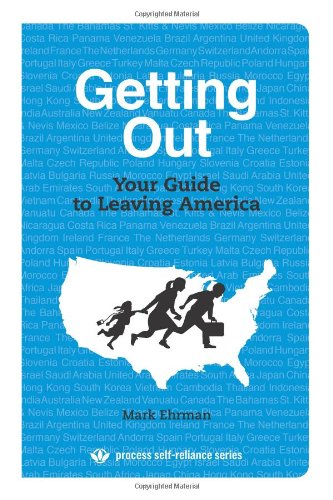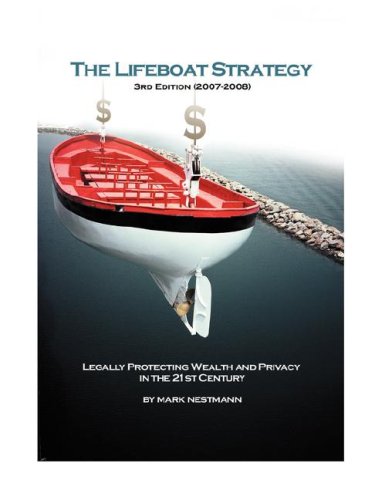Recently by Mark Nestmann: Hackers Now Targeting Smartphones – IsYoursNext?
Back in March, President Obama signed the largest-ever expansion of offshore disclosure requirements in U.S. history.
These provisions were neatly tucked into the “HIRE Act,” a bill designed to provide incentives for businesses to hire new employees. I wrote about it here and here.
For instance, once the offshore reporting provisions of the HIRE Act come into effect on Jan. 1, 2011, a single investment in an offshore mutual fund through a bank account held by an offshore LLC will require that you file seven separate reporting forms. (I discussed this and other provisions of the HIRE Act in my presentations last week at The Sovereign Society’s Offshore Advantage conference in Cabo San Lucas, Mexico.)
 Getting Out: Your Guid...
Best Price: $1.70
Buy New $14.00
(as of 12:20 UTC - Details)
Getting Out: Your Guid...
Best Price: $1.70
Buy New $14.00
(as of 12:20 UTC - Details)
However, the longer-term impact of the HIRE Act is even greater. The law imposes a 30% withholding tax on certain types of U.S-source income and gross sales proceeds to foreign financial institutions (FFIs) and many non-financial foreign entities (NFFE). (Broadly speaking, a NFFE is any non-U.S. entity that is not a FFI.) The only way to avoid the tax is for the FFI or a “withholding agent” for the FNFE to enter into a broad-based information reporting agreement with the IRS. These rules become effective in 2013.
If entering into such an agreement violates foreign law…well, too bad. For instance, the HIRE Act states that if a FFI refuses to enter into an agreement with the IRS, it must close all accounts owned by U.S. taxpayers. The definitions of a FFI and FNFE are so broad that these provisions will affect more than 500,000 foreign companies. By giving them this ultimatum, Congress and the IRS have, in effect, told them to “get lost.”
 The Lifeboat Strategy
Best Price: $45.58
Buy New $145.95
(as of 09:40 UTC - Details)
The Lifeboat Strategy
Best Price: $45.58
Buy New $145.95
(as of 09:40 UTC - Details)
The real question, though, is whether U.S. citizens and permanent residents will even be able to obtain offshore financial services after 2012. I think they will, but it will be in a sanitized form offered primarily by subsidiaries of offshore banks and brokers. Those subsidiaries will deal only with U.S. persons. They may elect to be taxed and regulated as a U.S. bank or securities broker. That means a reduced menu of investment options and zero privacy, since the subsidiary will be subject to most if not all U.S. laws and regulations.
Most offshore banks and brokers will take the easy way out, though. They’ll simply stop dealing with U.S. persons altogether, along with any type of entity with a U.S. owner
I’ve wondered if there might not be another way the offshore banks and brokers might deal with these regulations. What would happen they withdrew all their investments from the United States, closed their U.S. dollar clearing accounts in New York, and simply stopped dealing in dollars? In that event, it would be difficult for the IRS to enforce the HIRE Act withholding provisions. The banks could then deal with anyone they wanted to deal with, including U.S. persons, but only outside the U.S. dollar.
When I broached this idea in Cabo with some of my fellow speakers, they voiced skepticism. However, the idea clearly intrigued them. The biggest criticism – to which I don’t have an answer – is that any bank that took these steps would quickly find itself on a Treasury blacklist. The Treasury would simply announce that any FFI or FNFE that sent or received funds from the blacklisted institution would itself be blacklisted, or subject to other sanctions.
Of course, this assumes that by 2013, the U.S. Treasury will still have the financial and political clout that it does now. In a world where U.S. financial and political clout is rapidly declining, that’s hardly assured.
What do you think of this idea? I’d love to hear your comments!
November 15, 2010
Mark Nestmann is a journalist with more than 20 years of investigative experience and is a charter member of The Sovereign Society's Council of Experts. He has authored over a dozen books and many additional reports on wealth preservation, privacy and offshore investing. Mark serves as president of his own international consulting firm, The Nestmann Group, Ltd. The Nestmann Group provides international wealth preservation services for high-net worth individuals. Mark is an Associate Member of the American Bar Association (member of subcommittee on Foreign Activities of U.S. Taxpayers, Committee on Taxation) and member of the Society of Professional Journalists. In 2005, he was awarded a Masters of Laws (LL.M) degree in international tax law at the Vienna (Austria) University of Economics and Business Administration.





